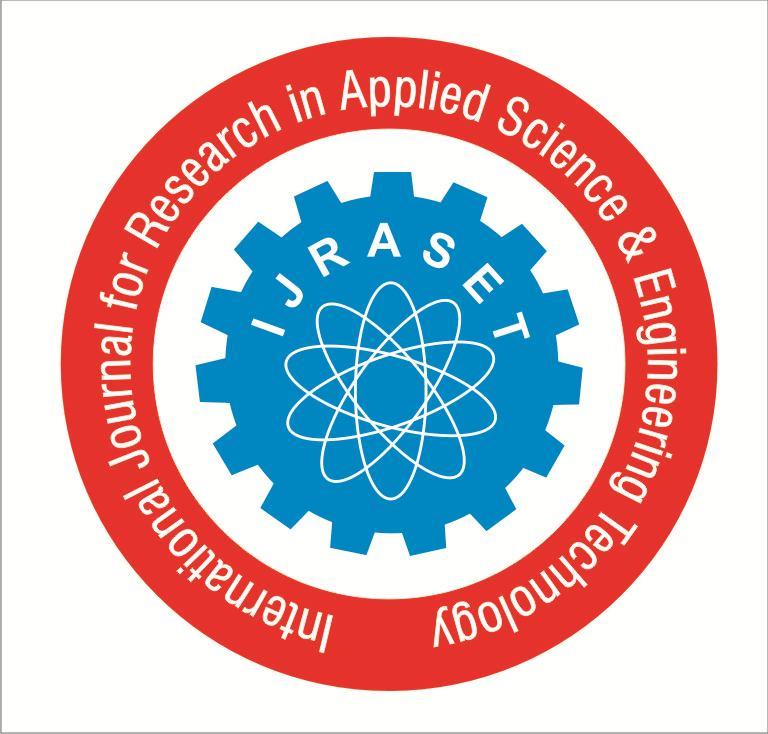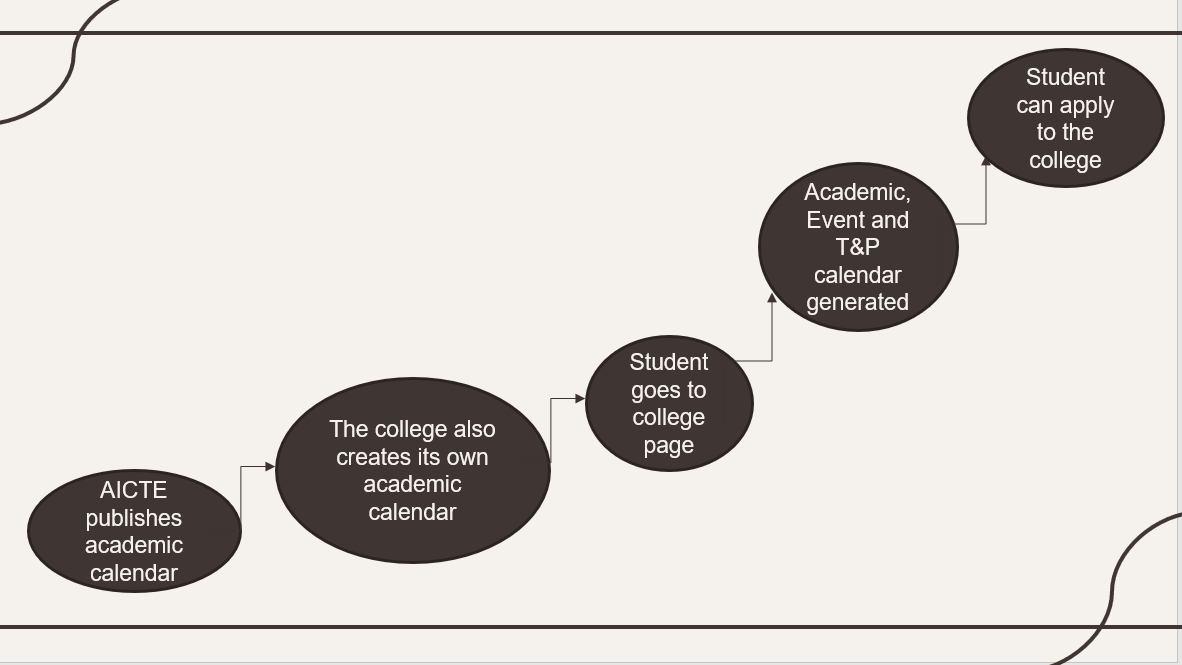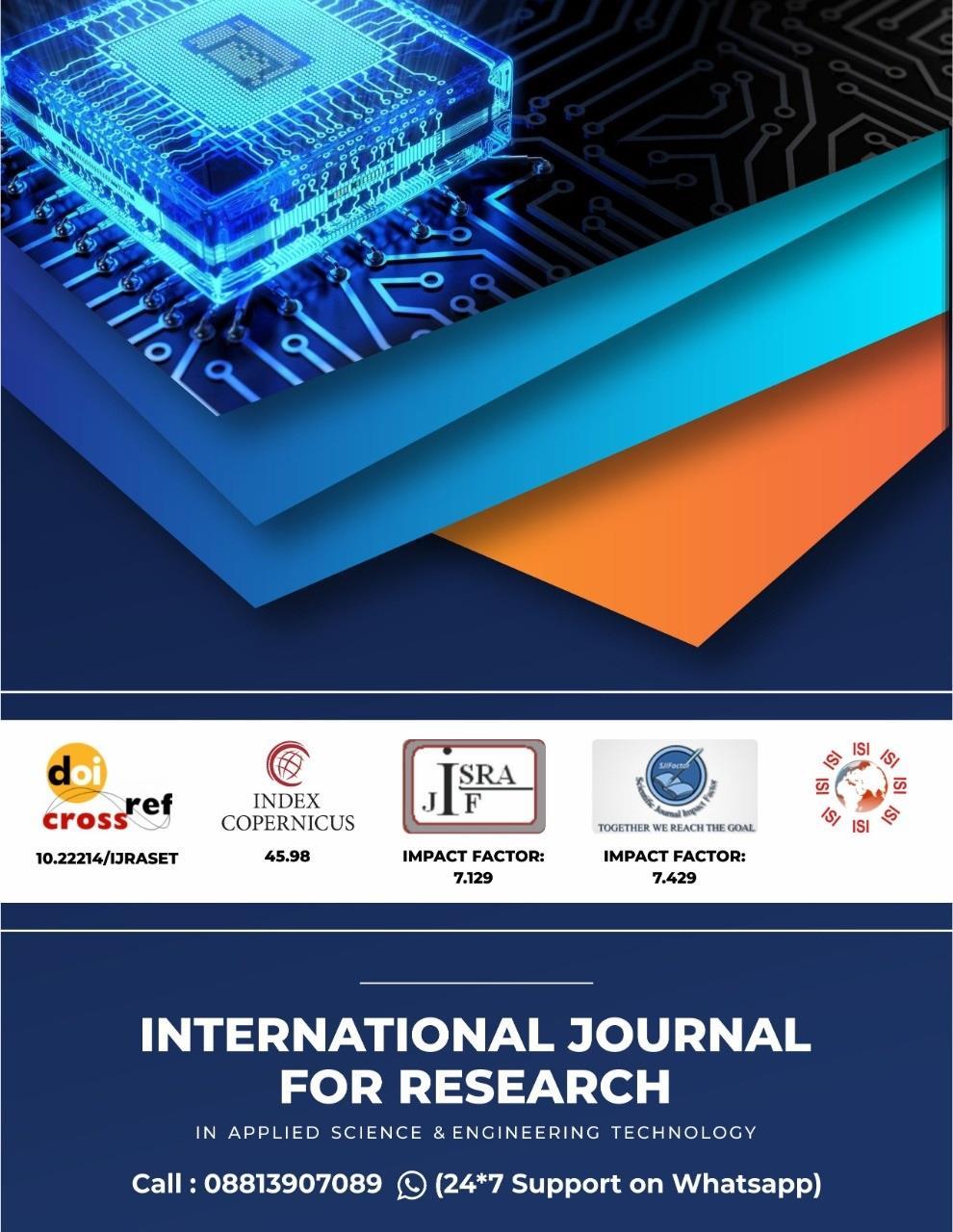
ISSN: 2321-9653; IC Value: 45.98; SJ Impact Factor: 7.538
Volume 10 Issue XII Dec 2022- Available at www.ijraset.com


ISSN: 2321-9653; IC Value: 45.98; SJ Impact Factor: 7.538
Volume 10 Issue XII Dec 2022- Available at www.ijraset.com
Prof. Sunil Yadav1 ,Hilag Shah2 , Hrithik Kumar3 , Sanskar Prasad4 1Assistant Professor, 2, 3, 4UG Student, Dr. D. Y Patil Institute of Technology, Pimpri, Pune

Abstract: With the onset of the technological revolution, the efficiency of the current manual systems has been improved drastically and the accuracy of the products produced are also increasing. The most affected of the fields from this technological change is Education. The combination of Education with technology has been coined as a new term of edtech. But even in these times Due to the autonomy given to then Indian Universities, the institutions have developed their own annual academic calendars. The students wanting to get admissions in other institutions need to wait for the results of the previous course. Students of those Institutions who complete their examinations and get results early have the opportunity to select the course of their choice and move to the University of choice while those whose results are declared late have no (Or) less options of courses and colleges available for them. Students also have to travel to each of these colleges to get information, apply and get admitted and so on. This results in huge cost and loss of time to students in their academic career. In order to provide level playing grounds for all the students there is a need for effective implementation of a common uniform calendar in all the colleges and Universities across the Nation. From studying various research paper, we realized that if we could introduce a central academic calendar and combine it with the idea of Artificial Intelligence for best date prediction, we could improve the efficiency of University admissions. Thus we aim to create a centralized calendar organization system which will in turn help universities become more disciplined and the students will get a more clear view and an equal opportunity for admissions to good colleges. This will save money, time, and increase the present efficiency of the system. In this project, we have studied different uses of calendars and how we can improve the efficiency of the calendars using AI and other algorithms. In this project we also aim to highlight the problems faced by students and the possible solution which could be designed to overcome the problem.
Index Terms: AI, AIYOJAN, University Management, Education, Calendar, Centralized Platform, Edtech
With the onset of the technological revolution, the efficiency of the current manual systems has been improved drastically and the accuracy of the products produced are also increasing.
The most affected of the fields from this technological change is Education. The combination of Education with technology has been coined as a new term of edtech.
But even in these times Due to the autonomy given to then Indian Universities, the institutions have developed their own annual academic calendars. The students wanting to get admissions in other institutions need to wait for the results of the previous course. Students of those Institutions who complete their examinations and get results early have the opportunity to select the course of their choice and move to the University of choice while those whose results are declared late have no (Or) less options of courses and colleges available for them. Students also have to travel to each of these colleges to get information, apply and get admitted and so on. This results in huge cost and loss of time to students in their academic career.
In order to provide level playing grounds for all the students there is a need for effective implementation of a common uniform calendar in all the colleges and Universities across the Nation.
From studying various research paper, we realized that if we could introduce a central academic calendar and combine it with the idea of Artificial Intelligence for best date prediction, we could improve the efficiency of University admissions.
Education has been playing an important role in our lives as the role of university and knowledge is immense in a student’s life. Getting admission into a quality institute is a dream of not only the students but also the parents. But it adds on to the anxiety when theytravel to the universityand the admissions are alreadyclosed as the universityresults are released at different times. Thus, a lot of hardships are to be faced by the student and their parents and a lot of their time and money are wasted in the process.

ISSN: 2321-9653; IC Value: 45.98; SJ Impact Factor: 7.538 Volume 10 Issue XII Dec 2022- Available at www.ijraset.com
Additionally, it becomes increasingly tough for the university to centrally manage the admission and the examination process. Thus we plan to solve the hardships of the students, parents and the universities by introducing a software based central academic calendar and introducing a central platform for the entire admission process management for universities thus saving time and money.
The main motivation behind the project is to give all students equal opportunity while applying for admissions, to create a central annual academic calendar will also make it easier for the all the universities to be managed easily and save a lot of money and time of universities as well as the parents and their peers.
With the onset of the technological revolution, India has immensely grown in the technological sector and we are trying to make maximum of our tasks online as it is easier to track as well as manage things digitally. In this technological era, our education institutions have also shifted many of their tasks online which in turn has resulted in increased efficiency of work. To develop an integrated annual academic calendar for all the Indian universities. Our aim is to develop a Centralized grievance system portal for all the Indian universities. There will be list of different Universities with details of the universities registered under AICTE.
As per the literature review the present system of university management is done manually rather than using technology. This has some following pros and cons –
Table 1 – Pros and Cons of Present System Pros Cons
The current system is consisting of more manual tasks; thus, the chances of data breach is low.
The current system is human dependent and thus can use human intelligence.
The present system is flexible as we can make changes at any step, we find there is a problem, like increasing number of people for better management.
The present system will take less computing power thus is a more environment friendly option.
The current system as consists of more manual tasks it is more time consuming.
The present system may involve human error.
The cost of implementation will increase with increase in the number of people.
The present system may fail to predict future outcomes as humans might fail to be as accurate as machines in prediction of future events.
Thus, though the pros and cons weigh out to be equal. The cons are quite critical and can cause troubled situations in longer run. Thus, the technology we plan to implement will reduce time, human error, the human effort and will make more accurate future predication thus reducing time, effort and cost while implementing the system.

ISSN: 2321-9653; IC Value: 45.98; SJ Impact Factor: 7.538 Volume 10 Issue XII Dec 2022- Available at www.ijraset.com
An Exploratory Study of Calendar Use
Manas Tungare, Manuel A PérezQuiñones, Alyssa Sams
2008
This paper presents to us how calendar can be used to organize various events in a better way. It helped us understand the application of academic calendar and how we can improve the entire system for providing better management.
Problems in online admissions to higher educational institutions of north Karnataka – A student’s perspective
Ramesh Kulkarni 2016
In this paper we understood the various hardships that are faced by the parents and the students during the admission process of various higher educational institutions in India.
Calendar Tools Dezhi Wu 2010
A Smart Calenar System Using Multiple Search Techniques
Jake Cowton, Longzhi Yang 2015
This paper helps us get introduced to help us understand the management uses of calendars.
This paper helps us understand the various ways in which we can use various algorithms to make an efficient calendar system for university management.
Our main objective via this project is to bring uniformity in the Indian Universities by introducing a calendar for management of the Indian Universities registered under AICTE. Our entire project is divided into 3 parts-
1) Student Section: The student section is the section which will be directly accessible to the users. It has some highlighting features like searching, checking the college calendar and application to the college all from a simple and easy to use model.
2) College Section: The College section will require login to access the functionality. The college will be able to access the calendar with full control to plan out the important events following the AICTE deadlines. The college statistics will also be available for all colleges to encourage healthy competition
3) Admin (AICTE) Section: The Admin section will require login and the credentials will be predefined. The admin will be able to create a generalized calendar which is to be followed by the colleges. This will ensure uniformity and discipline. The admin will also be able to see the statistical data of various colleges to cross check the following of schedules and cross check of student activity on the college page.
ISSN: 2321-9653; IC Value: 45.98; SJ Impact Factor: 7.538

Volume 10 Issue XII Dec 2022- Available at www.ijraset.com
1) AICTE publishes academic calendar – The central academic calendar is the calendar published by AICTE which is to be followed by all the universities.
2) The college also creates its own academic calendar – The college creates its own academic calendar according to the dates given by AICTE.
3) Student goes to college page – The student goes to the home page of the college to view the college information he/she is interested in.
4) The entire academic calendar is available in the college page.
5) The student can apply to the college directly from the college page.



A list of some of the basic algorithms applied in the project are as follows –
1) The search rank algorithm is based on the unique number of IP addresses that go to the college page in addition to the NIRF rankings.
2) User clicks on various cards appearing in search results. The order of the cards appearing next time will be dependent on the number of clicks from unique IP address.
3) In addition to clicks from unique IPs we have also taken NIRF ranking into consideration so that the search results are more relevant.
4) The algorithm takes into consideration both of these parameters and ranks the colleges based on the higher ranks and user visit.
1) The AI based date prediction is done by an algorithm developed by taking into consideration the dates given by admin, the dates that have already been occupied for an event and the working days of week.

ISSN: 2321-9653; IC Value: 45.98; SJ Impact Factor: 7.538
Volume 10 Issue XII Dec 2022- Available at www.ijraset.com
2) The date given by admin will be a range of start and end.
3) The event should be conducted in between the start and end date as prescribed by the central body.
4) The event date should also not be a national holiday.
5) All these parameters together contribute the date prediction of the date prediction in an accurate and efficient manner.
6) The model is trained to predict the most efficient dates by providing it with data from past year.
1) To overcome the limitations of multiple events at same time.
2) To scale the project to accommodate large data and improve speed.
3) We aim to integrate a grievance portal to bridge the communication gap between the universities and the governing body.
4) We aim to improve the AI and searching algorithms which could learn faster and be more efficient.
1) Simplicity-We have kept the product as simple as possible by maintain a simple and easy to use UI/UX design to simple and efficient backend algorithms. This not only decreases the server load and runtime but also makes the application usable for all the age groups. This is the main feature which would also help us scale in future if we want uniformity in our school system.
2) Auto Registration Of college in case of large database-AICTE is a government institution with numerous colleges under its control. Thus, registering each college on our website manually will be a hectic task. Thus, our backend algorithm comes into play here wherein the entire college data from the database is fetched just by one button click and the colleges are emailed the Login ID and Password.
3) Statistical Data-There are numerous colleges in India and the more the people search for a particular college the better will be the rank of the college. Thus, so asi to predict the admissions, to keep track of userbase and to compete in creating a larger userbase will together be reflected statistically on the college dashboard.
4) Efficient Algorithms-The backend algorithms be it search rank, calendar planning, bookmarking or many more features the backend algorithm has been written with the utmost efficiency so that there is more of logic and less of code that works at the back, without any compromise on the performance.
5) Data Security-The entire database is managed in a very efficient manner with our main focus on data hiding and prevention of data leaks. All the passwords on the site havebeen encrypted and also, we have not allowed AICTE admin to directly access the college passwords and auto generated the passwords to add an extra layer ofprotection.
6) One Stop platform for the entire university event planning-The highlighting and the main feature of our project is the calendar which will be a centralized and once AICTE mentions the event deadlines the events will be organized into 3 groups-Academic, Events and T&P automatically and thus would help to create a one stop platform for uniforming the university event management.
This project has proposed real time solution for the one of the major causes of the late admissions and how the fairness of the admissions can be improved. We propose to implement the given solution with the help of Artificial intelligence techniques and predict the best dates to organize exams and events to avoid conflict and attract maximum crowd.
We solved the problems of –
1) Lack of an integrated annual academic calendar for all the Indian universities
2) Government agencies unable to implement their schemes in all the academic institutions effectively due to a single integrated manner
3) Lack of uniformity results in huge cost and loss of time to students in their academic career
4) An integrated annual academic calendar for all the Indian universities will bring better integration for the students going to different institutions for the higher degree program
Our solutions were
a) Implementation of integrated annual academic calendar for all the Indian universities
b) Ease in implementation of schemes in all the academic institutions effectively due to a single integrated manner
c) Addition of uniformity via an academic calendar
d) An integrated annual academic calendar for all the Indian universities

ISSN: 2321-9653; IC Value: 45.98; SJ Impact Factor: 7.538 Volume 10 Issue XII Dec 2022- Available at www.ijraset.com
This project and the research behind it would not have been possible without the exceptional support of our supervisor, Prof. Sunil Yadav. His enthusiasm, knowledge and attention to detail have been an inspiration and kept our work on track We are also grateful for the insightful comments offered by Prof. Subhash A Nalawade - HOD Information Technology and Dr. L. K. Wadhawa Principal - Dr. DY Patil Institute of Technology for his constant support. The generosity and expertise of one and all have improved this study in innumerable ways and saved us from many errors.
[1] Tungare, Manas & Pérez-Quiñones, Manuel & Sams, Alyssa. (2008). An Exploratory Study of Calendar Use. International Journal of Management (IJM).
[2] Kulkarni, Ramesh. (2016). PROBLEMS IN ON-LINE ADMISSIONS TO HIGHER EDUCATIONAL INSTITUTIONS OF NORTH KARNATAKA-A STUDENTS PERSPECTIVE. International Journal of Management (IJM). 7. 37-42.
[3] Wu, Dezhi. (2010). Calendar Tools. 10.4018/978-1-60566-776-8.ch004. International Journal of Management (IJM).
[4] Cowton, Jake &Yang, Longzhi. (2015). ASmart Calendar System Using Multiple Search Techniques.
[5] Lalit Mohan Joshi (2015). AResearch Paper on College Management System.International Journal of Computer Applications (0975 8887).Volume 122, No.11, July 2015
[6] Zheng Yinga , Sui Zhigangb , Shen Qingfengb(2012). Research on University Management Innovation Based on Knowledge Management. IPEDR. 2012. V49.25
[7] Smith, Julia &Tipton, Elizabeth. (2018). Impact of Academic Calendar System Changes on Bachelor Degree Completion.
[8] Khmelevsky, Youry. (1998). Organizational problems of University Management Information Systems. 1. 177-178.
[9] Radel, F.. (1979). Problems and limitations of university management. SouthAfrican Journal of Business Management. 10. 87-92. 10.4102/sajbm.v10i3.1270.
[10] Wang, Mei. (2022). Order Management and Completion Date Prediction of Manufacturing Job-Shop Based on Deep Learning. Computational Intelligence and Neuroscience. 2022. 1-10. 10.1155/2022/3458116.
[11] Subero, Armstrong. (2020). Searching Algorithms. 10.1007/978-1-4842-5725-8_8.
